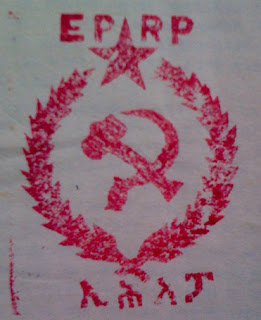 |
| From Abyot, 1978. EPRP, EPRA, EPRYL, ELAMA logos. |
The hammer and sickle icon was developed in Russia during its 1917 revolution. The hammer symbolizes the proletariat, and the sickle the peasantry. Like Ethiopia, Russia was a country with vast social forces outside the urban working class, and the Bolsheviks wisely sought ways to symbolically reflect this necessary alliance of power and unity against oppression and exploitation. The hammer and sickle became the symbol of communism, wielded proudly by socialist revolutionaries of every imaginable ideological stripe around the world, and wielded menacingly by anti-communist reaction as proof of communism's authoritarian violence.
While the hammer and sickle was replaced by various socialist movements, especially in developing countries seeking to suggest independence from the Soviet Union, it seems to have become the absolute symbol of the Ethiopian revolution's socialist ambitions.
It was adopted by the Ethiopian People's Revolutionary Party, despite the EPRP's general animosity to the modern revisionist Soviet leadership, and used by their mass organizations like the Ethiopian People's Revolutionary Army (EPRA), the Ethiopian People's Revolutionary Youth League, and the EPRP's revolutionary trade union ELAMA.
But in altered form, the hammer and sickle was also used by the All-Ethiopia Socialist Movement (Meison), EPRP's main leftist competitor, and by EMALEDH, the Union of Ethiopian Marxist-Leninist Organizations that was an abortive attempt to unite Ethiopia's civilian left behind the Derg. And of course the hammer and sickle was adopted by the Derg itself, as a symbol of its eventual governing face the Workers Party of Ethiopia, and of Ethiopia's general allegiance to the socialist camp.
 |
| Ethiopian People's Revolutionary Army logo (EPRA) |
 | |
| EPRP logo per Wikipedia |
 | |
| Meison journal cover, from Red Terror museum |
 | |
| Meison logo per Wikipedia France |
 | |
| Meison logo per Wikipedia |
 | |
| EMALEDH's Yehibret Demts, Feb 1979 |
 | |
| EMALEDH float? Pro-Derg rally. |
 | |
| Derg banners and billboards, Addis Ababa |
No comments:
Post a Comment